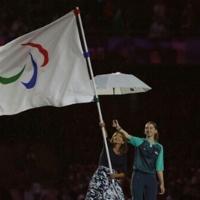The International Paralympic Committee’s decision to lift the temporary suspension of Russia and Belarus is a “bold step” but “many will argue it is premature” while the conflict continues, a former IOC executive told AFP.
The vote at the IPC’s general assembly in Seoul on Saturday was a close-run thing but the narrow majority of 51.7% potentially opens the way for Russian and Belarusian athletes to compete under their own flags at the Winter Paralympics in Milan-Cortina next year.
Russia invaded Ukraine over three years ago, in February 2022, and peace appears a distant hope — Moscow unleashed a massive drone and missile attack against Ukraine lasting 12 hours overnight Saturday.
Terrence Burns, a former IOC marketing executive, told AFP the IPC was trying to perform a delicate balancing act.
“It’s a bold and consequential and controversial step,” the American said.
“The IPC is trying to balance athlete rights, sporting principles, and moral legitimacy.
“But yes, many will argue it is premature while the conflict continues and civilians suffer.
“The optics are very sensitive, and this won’t be judged merely in sporting terms.”
The IPC’s change of tack contrasted to that of the International Olympic Committee (IOC), whose Executive Board earlier this month maintained the status quo from the 2024 Paris Olympics and Paralympics, with Russians and Belarusians competing as neutral athletes.
Burns, who since leaving the IOC has played a role in five successful Olympic city bids, said the IPC vote will “almost certainly reverberate” at IOC headquarters in Lausanne, where Kirsty Coventry assumed the reins as president in June.
“Although the IOC and IPC are separate, the public and media will view them as connected players,” Burns said.
“The IOC under President Coventry is already signaling a more dialogue-driven approach to reintegration questions.”
The IOC said Monday it “acknowledged” the IPC’s decision.
– ‘Pandora’s box’ –
Russia was suspended by the IOC in 2023 for violating the Olympic Charter by incorporating sports councils in four regions in eastern Ukraine.
However, at the most recent IOC Executive Board meeting this month the IOC “committed to finding a pathway for every NOC to participate… in the Dakar 2026 Youth Olympic Games”.
Burns, though, believes the IOC might have a tough task justifying Russia returning to the fold for that event in Dakar.
“That’s a bit of a minefield,” he said. “The Youth Olympics are supposed to foster inclusion and positive values among young people.
“But any decision to include or exclude has to stand up to scrutiny, especially if the country in question faces credible allegations like child abduction.
“The IOC will have to show consistency, transparency, and moral grounding if it goes that route.”
Michael Payne, a former head of the IOC’s marketing, said on a global level sport “is in a very difficult, if not impossible, situation”.
“Arguably one of the greatest threats facing the movement is the increasing political weaponisation of sport,” the 67-year-old Irishman told AFP.
“If your fundamental mission is to bring the world together, through peaceful sports competition, once you start suspending one nation for war or atrocities, where do you stop? You open a Pandora’s box.”
Payne pointed out that Coventry and her top leadership had decided to form a working group to review the overall mission of the IOC “and how to manage the increasing conflicts around the world”.
Ukraine’s Sports Minister Matviy Bidnyi reacted with disbelief at the IPC’s decision, telling AFP he hoped the Italian hosts of the Winter Paralympics and the organising committee would refuse to go along with it.
Burns said “Ukraine is absolutely due a voice”, although it is the IPC that “hold the final authority over eligibility and participation”, and their best bet would be for individual sports federations to bar the Russians.
That final decision on Russia’s participation is indeed with the sports federations — and some have stood firm in their refusal to allow Russians or Belarusians to take part. In summer sports, athletics and equestrian have barred them and biathlon and skiing have taken the same step in winter sports.
Burns believes some will not wilt even after the IPC vote.
“I don’t see them all flipping overnight, especially in sports where the moral stakes feel very real,” he said.
“But if the IPC or IOC signals a ‘new normal,’ some federations under financial or political pressure might revise positions.
“Federations tend to follow where power and legitimacy coalesce.”
pi/gj


